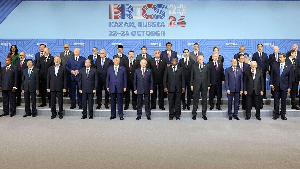 Some world leaders in a group photograph
Some world leaders in a group photograph
On January 29, 2025, ECOWAS officially confirmed the withdrawal of Burkina Faso, Mali, and Niger from the organization. These three nations, now part of the Alliance of Sahel States (AES), have increasingly distanced themselves from West Africa’s traditional regional structures, opting instead for a new path that aligns with their geopolitical and economic interests.
Their departure has reinforced discussions on regional realignments, particularly in light of their aspirations to join BRICS. This move signals a broader shift in global power dynamics, with BRICS emerging as a viable alternative for nations seeking to reduce their dependence on Western-led financial institutions.
Against this backdrop, Ghana is now exploring the possibility of joining BRICS+ as a partner state. The West African nation, which shares a border with Burkina Faso, is watching closely as its neighbour charts a new course without the backing of the International Monetary Fund (IMF) or the World Bank.
Burkina Faso, under the leadership of Captain Ibrahim Traoré, has undertaken significant reforms, focusing on agricultural self-sufficiency, infrastructure development, and social investment.
Schools, hospitals, and sports facilities are being built, signaling a commitment to national development outside the constraints of Western financial oversight. This transformation has not gone unnoticed in Ghana, where economic policy remains heavily tied to IMF agreements, particularly after President John Dramani Mahama’s administration undertook structural reforms to secure financial assistance.
During Mahama’s inauguration on January 7, 2025, Captain Traoré’s presence and the warm reception he received reflected the growing camaraderie between Ghana and Burkina Faso.
While Ghana has historically maintained a stable political and economic system within the framework of ECOWAS, the AES realignment has introduced new considerations for Accra. The possibility of working more closely with BRICS+ aligns with Ghana’s long-term goal of diversifying its economic partnerships and securing investment on fairer terms.
Ghana’s potential involvement in BRICS is driven by economic pragmatism. Experts argue that the country needs large-scale infrastructure investment and sustainable economic growth to transition to a middle-income economy. The BRICS New Development Bank could provide an alternative to IMF backed financing, allowing Ghana greater fiscal flexibility while reducing reliance on loans tied to stringent austerity measures.
Economist Natogmah Issahaku from the University of Lincoln, UK, has pointed out that BRICS’ model of cooperation, which prioritizes equitable development, could help Ghana optimise its trade potential and industrial capacity. In exchange, Ghana could offer BRICS+ partners access to its processed agricultural goods, manufactured products, and mineral resources, creating a mutually beneficial trade relationship.
The political and security dimensions of this realignment cannot be overlooked. On January 16, 2025, President Mahama and Mali’s Prime Minister Abdoulaye Maïga met to discuss regional stability and counterterrorism efforts. The growing threat of jihadist insurgencies in the Sahel has underscored the need for cross-border cooperation.
Mahama emphasized Ghana’s commitment to regional security, stating, “If your neighbour’s house is on fire, you must help put it out, or the flames will reach your own.” His remarks signalled a recognition that Ghana cannot afford to ignore the shifting political landscape of West Africa. Maïga, in turn, praised Ghana’s role in promoting pan-Africanism, acknowledging the country’s consistent advocacy for African sovereignty and regional collaboration.
The idea of Ghana aligning more closely with BRICS remains under consideration, but the advantages are clear. Beyond access to alternative financing and trade partnerships, engagement with BRICS+ could allow Ghana to participate in shaping a more multipolar global order one that prioritizes development on fairer terms. While the country remains engaged with ECOWAS and IMF-backed reforms, the shifting tides of West African politics suggest that Accra will continue to explore new avenues to secure its economic and geopolitical future.